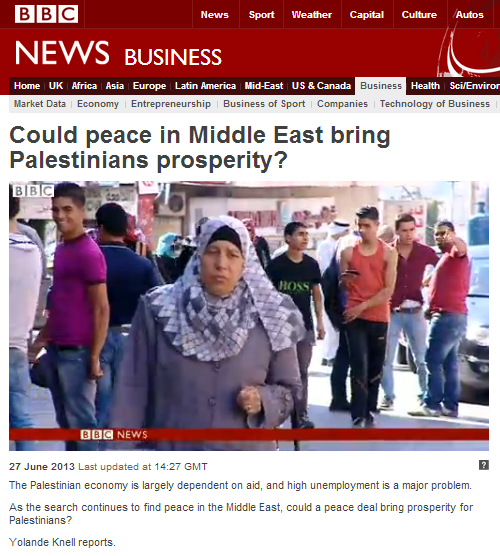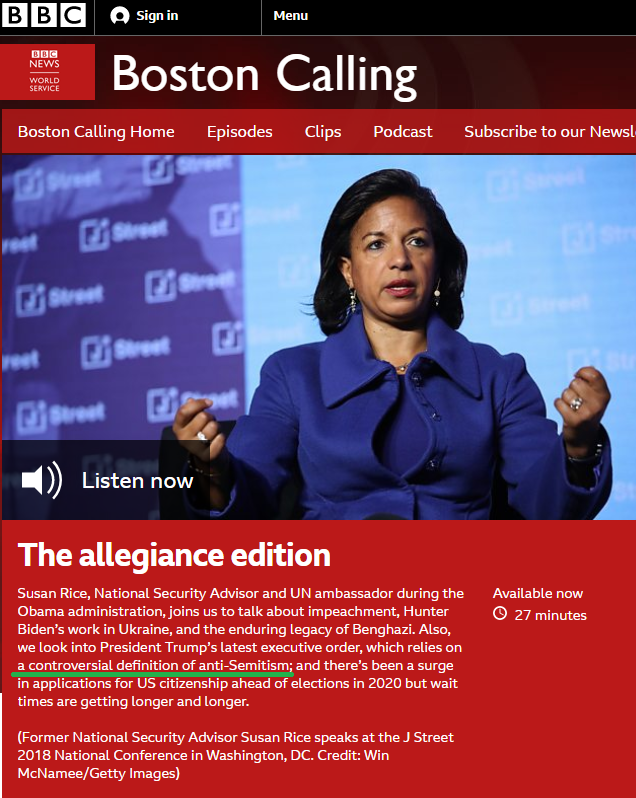Over the past week or so, the BBC has put considerable effort into amplifying and promoting Hamas’ main pre-condition for a ceasefire: the removal of border restrictions imposed by Egypt and Israel in response to terrorism against their citizens carried out by terrorist organisations in the Gaza Strip. Documentation of some of those BBC efforts can be seen here, here, here and here.
In the past few days, however, we have seen a shift in the BBC’s approach to the topic. No longer content with ‘merely’ providing context-free advertisement for the demands of a proscribed terror organisation, the BBC has now adopted that organisation’s terminology, ditching its former use of the phrase “economic blockade” for the inaccurate and partial term “siege”.
Here is a screenshot from the July 28th edition of BBC Two’s flagship news and current affairs programme ‘Newsnight’.

One presumes that the BBC is familiar with the Oxford English Dictionary. Here is its definition of a siege:
“A military operation in which enemy forces surround a town or building, cutting off essential supplies, with the aim of compelling those inside to surrender.”
A besieging army does not ensure and facilitate the provision of humanitarian aid including food and medical supplies to those it surrounds. It does not supply them with 50% of their electricity supply, with oil and diesel or with cooking gas. It does not help them export their produce and give their farmers agricultural training. It does not evacuate their sick and treat them – sometimes at its own expense – in its own hospitals.
Israel of course does all of the above – and more – and critically, Israel’s aim is not to compel “those inside to surrender”, but to prevent in as far as is possible the flow of weapons and dual-use goods which can be used to manufacture weapons into the Gaza Strip because for fourteen years its own civilians have been under attack by terrorist organisations located there.
So why does Hamas insist upon inaccurately calling the border restrictions implemented by Israel and Egypt a “siege”? Firstly because it sounds much more dramatic for propaganda purposes and enables it to assume the role of the attacked. Secondly, any real and honest presentation of the situation should prompt observers to ask why those restrictions were implemented in the first place and that leads to the subject of Hamas terrorism, which does not line up with the current Hamas strategy of presenting itself to the world as the freedom-loving champion of impoverished, besieged Palestinian victims.
Another example of this recent embrace of the language of that terrorist organization was seen on July 30th in yet another filmed backgrounder report produced by the BBC’s diplomatic correspondent James Robbins. The item was also promoted on the BBC News website’s Middle East page under the title “Gaza conflict: Is there hope for a ceasefire?“.
There, Robbins distinguished himself by managing to present BBC audiences with an inaccuracy and/or a serious omission in almost every sentence of his report.
“It’s almost three weeks since Israeli airstrikes against Hamas in Gaza began.”
What preceded those airstrikes – almost a month of incessant missile fire on Israeli civilian communities – is not communicated to BBC audiences.
“All the appeals to both sides to stop have so far failed.”
Not so. The actual timeline of events reads thus:
- 15 July: Israel accepted the ceasefire initiated by Egypt and stopped all fire at 09:00. However, terrorists fired more than 50 rockets at Israeli communities. Only after six hours of continuous rocket attacks did the IDF respond.
- 17 July: Israel agreed to a five-hour humanitarian ceasefire. The terrorist organizations rejected it and fired rockets, including at the city of Be’er-Sheva.
- 20 July: Israel approved a two-hour medical/humanitarian window in the area of Shejaiya, following an International Committee of the Red Cross (ICRC) request. Forty minutes after the ceasefire began, Hamas violated it. Nevertheless, Israel implemented the ceasefire, even extending it for two more hours.
- 26-27 July: Israel respected an UN-requested humanitarian ceasefire from 08:00-20:00 on Saturday, 26 July. Israel announced its readiness to prolong the ceasefire until midnight, but a few minutes after 20:00, Hamas renewed firing rockets at Israeli civilians. On the same day (26 July), Hamas announced a 24-hour humanitarian ceasefire, at 14:00. Hamas violated its own ceasefire a short time later.Despite Hamas’ continuous fire, Israel decided to extend the humanitarian ceasefire a second time, from midnight Saturday to midnight Sunday.
- 28 July: Israel accepted Hamas’ request for a ceasefire in honor of the Muslim holiday of Eid al-Fitr. The IDF was instructed to cease military attacks, but Hamas continued to launch rockets at Israel.
- 30 July: Israel announced a temporary humanitarian ceasefire between 15:00-19:00. A few minutes after the ceasefire began Hamas fired rockets at the southern cities of Ashdod and Ashkelon, as well as other Israeli communities.
Robbins goes on:
“The scale of civilian death and suffering in Gaza has opened up rifts between Israel and her traditional ally the United States, creating another layer of mistrust.”
Aha – that must be why the US has just approved a new transfer of military equipment to Israel.
“Israeli deaths, although much lower and overwhelmingly of soldiers – not civilians – continue to rise. It’s a price Israel’s leaders believe has to be paid to disarm Hamas completely.”
Robbins makes no effort to inform viewers of two very significant factors which contribute to the difference in the numbers of civilian casualties in Israel and Gaza: Israel’s extensive investment in civil defence, including the Iron Dome, and Hamas’ use of civilians in the Gaza Strip as human shields. Then, for the second time in six days, he misrepresents the aim of Israel’s operation in the Gaza Strip: a topic on which he goes on to inaccurately elaborate.
“So what is still driving this conflict? Why is the search for a ceasefire proving so difficult? Partly because Israel’s overriding aim is to disarm the militant Palestinian organization Hamas completely. To destroy so much of its arsenal that it would be hard for Hamas to rearm in the future. Israel needs more time to continue that destruction.”
Remarkably, Robbins fails to inform viewers of the rather critical fact that Hamas is an internationally proscribed terrorist organization.
The disarming of Hamas was never declared an objective of this operation by Israeli leaders. Its often repeated aim is to enable the civilians of Israel to live their lives quietly and securely without missile fire from terrorist organisations in the Gaza Strip. The attempted cross-border tunnel infiltration by Hamas terrorists on the morning of July 17th made a ground operation to neutralize Hamas’ attack tunnels necessary. Whilst many politicians and members of the general public in Israel are of the opinion that Hamas should be disarmed and the Gaza Strip made into a demilitarized zone for the wellbeing of both Israeli and Palestinian civilians, it was never Israel’s declared (and unrealistic) aim to destroy every last missile in the Gaza Strip.
Robbins continues, with use of Hamas terminology both in his narration and in the accompanying illustrative graphic.

“The Hamas priority is to force the lifting of the siege of Gaza and get Israel to commit to that before – not after – a ceasefire. For the past eight years the thin sliver of land which is the Gaza Strip has been largely cut off, with Israel and Egypt controlling all movement in and out across its borders – of people and supplies as well as food – while the Israeli navy blockades Gaza from the sea.”
Once again, Robbins fails to inform BBC audiences what brought both Egypt and Israel to implement border restrictions, but of course it is rather difficult to explain Hamas terrorism if one has already avoided any mention of the fact that Hamas is a terrorist organization. Despite Robbins’ obviously deliberate attempt to mislead viewers, there are of course no restrictions on the entry of foodstuffs to the Gaza Strip; the only controlled items are dual-use goods which could be used for the purpose of terrorism.
He carries on with still more use of Hamas terminology:
“But the siege hasn’t stopped Hamas building a network of concrete reinforced tunnels under its borders and arming itself with rockets to fire at Israeli towns and cities.”
Notably, Robbins makes no attempt to explain to audiences the purpose of those tunnels and – like all BBC reporting in the past three weeks – fails to mention which regional actors have helped Hamas to arm itself and why the removal of border restrictions would make rearming – and further conflict – inevitable in the future.
Robbins then goes on to display the full extent of his lack of Middle East expertise.
“And there are wider reasons why it’s so difficult to stop the fighting. Israel insists that Hamas must recognize Israel’s right to exist and says it can never trust Hamas if it’s committed to destroying the Jewish state. But Hamas won’t trade away that big card – at least until peace talks are at such a stage that they’re much closer to delivering an independent Palestinian state.”
Frankly, it is becoming excruciatingly embarrassing to see a succession of so-called BBC experts claiming that Hamas would down arms and disband if only a Palestinian state came into being. The fact that this grossly inaccurate notion is pawned off to BBC audiences as analysis not only shows the lack of competence at work, but also the inability of BBC staff to come to terms with the unpleasant underlying realities of the conflict.
Robbins then brings in an expert – Dr Hisham Hellyer – whose decidedly non-academically objective sentiments on the topic are easily identifiable on his Twitter feed.
“So expert observers suggest this current conflict can have no good outcome.”
Hellyer: “I think it produces yet another generation of people in Gaza who will not be interested in securing Israel’s security but ensuring Israel’s insecurity. And I think that bombardment is simply not going to work. It may delay another period of disquiet, as the Israelis put it, but that’s all it’s going to achieve; a delay.”
Robbins closes:
“For now the killing seems unstoppable. Both sides want any eventual ceasefire to look like their victory. And so far, neither side has got what it wants.
Beyond the glaringly obvious problem presented by the fact that a publicly funded Western media organisation has chosen to embrace, amplify and promote the language of a proscribed terror group, there is clearly another very simple issue at stake with the BBC’s adoption of the term “siege” in relation to the Gaza Strip: it is not accurate.
And not only does it not accurately describe the situation, but its use actively prevents BBC audiences from understanding why border restrictions do exist. Remarkably, despite this topic being the subject matter of numerous BBC reports over the past week or so, the BBC apparently thinks it acceptable to fob off audiences with dumbed-down Hamas propaganda rather than to accurately and comprehensively explain the issue.





